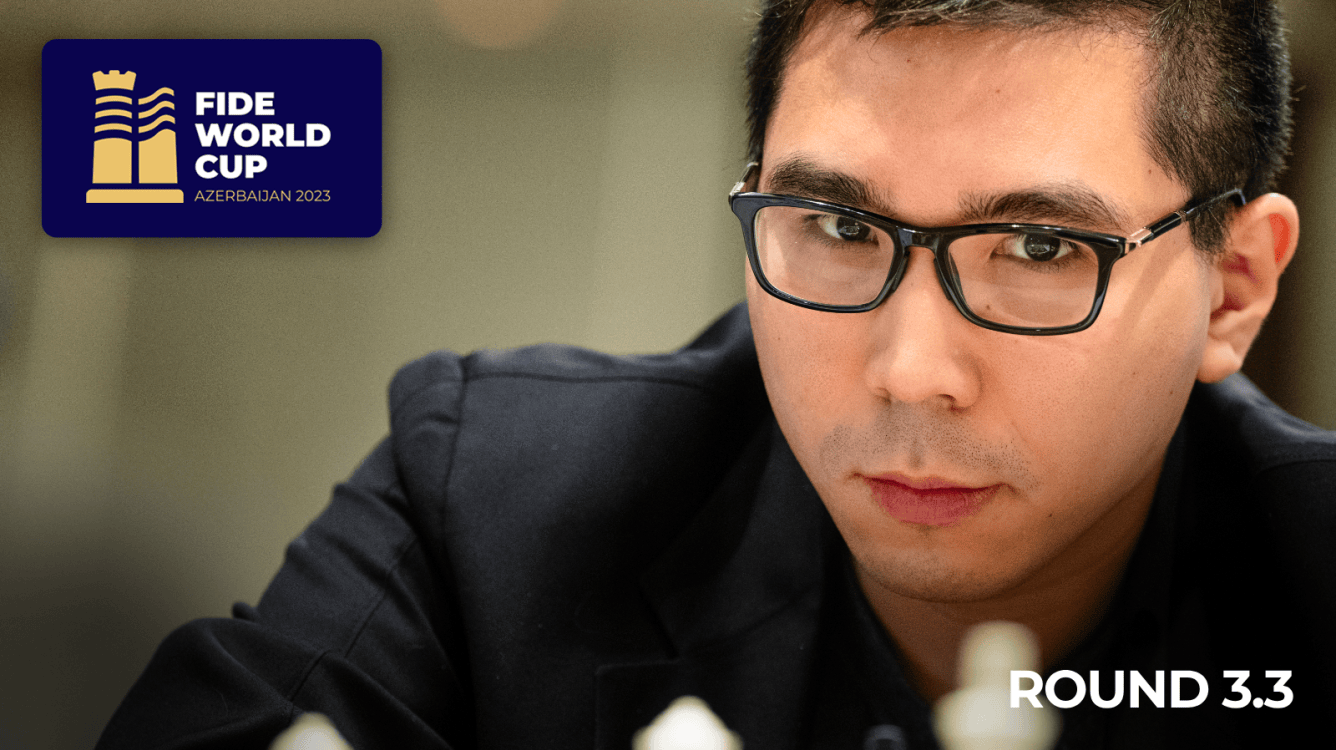
Giri Gone, So Survives, Kosteniuk Knocked Out On Tense Day Of Tiebreaks
The round three tiebreaks led to an unpleasant day for many of the higher-rated players in the 2023 FIDE World Cup, especially for GM Anish Giri, who was knocked out of the event by GM Nijat Abasov. GM Teimour Radjabov also fell at the hands of GM Jaime Santos Latasa, and GM Wesley So was moves away from an exit of his own.
The Women's section experienced a huge upset as IM Teodora Injac needed just the first rapid tiebreak to eliminate defending champion GM Alexandra Kosteniuk, while GM Harika Dronavalli needed eight tiebreak games to secure her spot in the fourth round.
The first rest day has been reached, and round four will begin on Wednesday, August 9, at 7 a.m. ET / 13:00 CEST / 4:30 p.m IST.
With 23 tiebreak encounters following balanced classical matches from the previous day, Leko and Naroditsky were predicting a long day where many matches would make it all the way to the blitz tiebreaks. They were half right: it was a long day indeed, but not for the majority of players as only 6 matches made it past the first set of rapid games.
- 25-Minute Games: 17 Players Eliminated
- 10-Minute Games: 3 Players Eliminated
- 5-Minute Games: 1 Player Eliminated
- 3-Minute Games: 2 Players Eliminated
25-Minute Games: 17 Players Eliminated
19 games in the Open section and four games in the Women's section were undecided in the classical games and moved into two-game matches at a 25+10 time control. The first game brought 13 decisive results in the Open section and three in the Women's section, and placed many players in a must-win situation—10 of which had to play for a win with the black pieces.
Winning on demand with the black pieces proved to be a near-insurmountable challenge, with only IM Mai Narva able to extend her match against GM Tan Zhongyi. Many players with first-game wins opted for a safe route to the next round with a draw in the second game, but six players achieved a 2-0 victory over their opponents in the first tiebreak match.

GM Andrey Esipenko had an impressive performance to eliminate GM Francisco Vallejo Pons 2-0 in the tiebreaks, invading with his knights for a 22-move victory with Black in the first game and shutting down any hopes of a comeback in the second. GM Radoslaw Wojtaszek dashed GM Ivan Schitco's hopes of another upset victory by holding onto his endgame advantage in their first rapid game and allowing Schitco no chances in their second.
Vallejo is busted in 14 moves against Esipenko! https://t.co/jy4fLaTfKu #FIDEWorldCup pic.twitter.com/25pNyqGMcH
— chess24.com (@chess24com) August 7, 2023
Following two wild classical games, it was hard to predict what would happen in the tiebreaks between GM Fabiano Caruana and GM Mustafa Yilmaz. In a sharp battle, the American grandmaster put pressure on his opponent from the opening, and Yilmaz ended up substantially down on the clock with only a minute to calculate how to ward off an attack.
He put up a stubborn defense and dragged Caruana down to equally little time remaining on the clock, but the reigning U.S. champion calmly traded queens into an endgame where his extra passed pawns provided a road to victory that didn't require any deep thought.

Yilmaz will be disappointed that their second rapid game went south very quickly, but the Turkish grandmaster can be proud of how many problems he posed in his match against the world number-three. A Turkish grandmaster who was successful in his upset attempt was GM Vahap Sanal, who eliminated GM Anton Korobov in a 2-0 victory where Korobov had small chances in the second game but went catastrophically astray in the endgame.
Injac's 2-0 rapid match victory over Kosteniuk was an impressive showing from the three-time Serbian women's champion in her first-ever tiebreak match, especially from a player who doesn't consider herself to be strongest in classical time controls. In their first rapid game, Kosteniuk missed a perpetual check that would have saved a draw. IM Adrian-Marian Petrisor has analysed that game.
The former women's world champion was given no such chances in the second game. Indjac shared her thoughts on sending the defending champion home in the interview below.
Fan-favorite GM Vasyl Ivanchuk triumphed over GM Wei Yi in their second game in an endgame where the Chinese super-GM's logical queen trade ended up being an inaccuracy that was the beginning of the end. A similarly disastrous queen trade for GM David Howell against GM Wang Hao ultimately sent the Englishman packing as he failed to win on demand in the second rapid game.
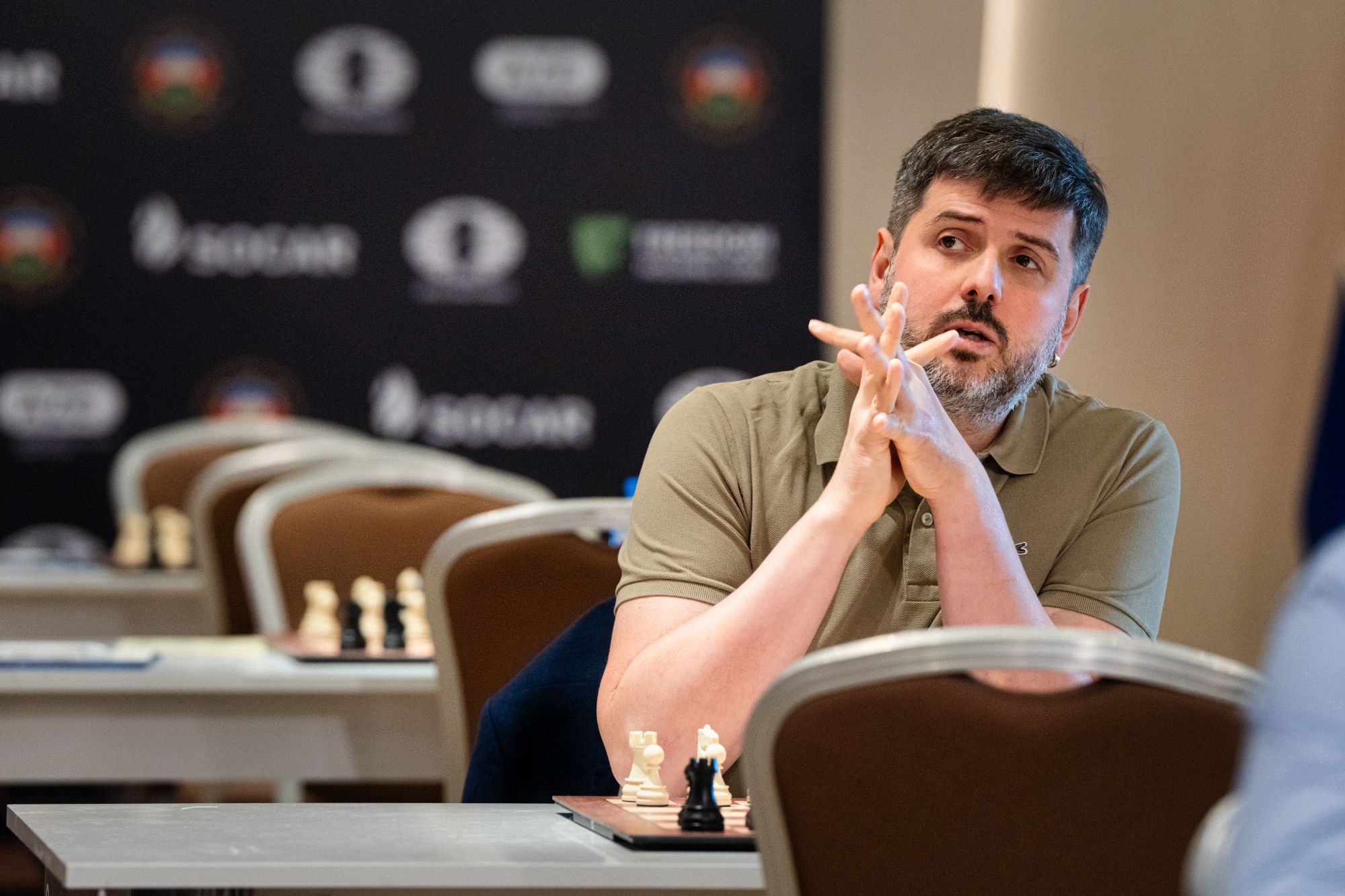
GM Peter Svidler gave GM Jorden van Foreest few chances and moves on to the next round, as does youngster GM Nihal Sarin who was never in serious trouble in his tiebreak match. Iranian teenager GM Bardiya Daneshvar was unable to pull off another World Cup upset, as GM Saleh A.R. Salem was able to pounce on the opportunity to salvage a draw in game one and won a convincing game two.
In a game between GM Etienne Bacrot and GM Yu Yangyi, Yu looked well on his way to the win that would secure his spot in the next round until disaster struck. Can you find the combination the French grandmaster executed on his way to winning the game and his match?
One wrong check in time trouble was all it took to end Radjabov's World Cup, as Santos seized the opportunity he was given and brought home the full point before affording Radjabov a draw in the second game that will be little consolation for one of the top seeds in the event.
A shock loss for 2019 World Cup winner Teimour Radjabov, who now needs to hit back on demand with Black vs. Jaime Santos! https://t.co/LqtdlzP9IF #FIDEWorldCup pic.twitter.com/hxioLWFmlc
— chess24.com (@chess24com) August 7, 2023
Other players who triumphed in the first set of rapid games were an in-command GM Ian Nepomniachtchi, defending champion GM Jan-Krzysztof Duda, and Swedish GM Nils Grandelius, who was able to send home six-time African Champion GM Bassem Amin. GM Ferenc Berkes was able to pick up a big victory against GM Nikita Vitiugov to move on to the next round.
On average, the 25-minute tiebreaks were not a good time to be higher-rated in the Open section, as nine of the 15 decisive match results saw the higher-rated player heading home, among them no fewer than five 2700-rated players.
All Games - Open and Women's Round 3 tiebreaks: 25-minute games
10-Minute Games: 3 Players Eliminated
With just six games moving on to the two-game 10+10 tiebreak matches, it was easier to follow the games and enjoy the drama that unfolded in every matchup.

So's match against GM Jules Moussard was a big one to watch, as the Filipino-American grandmaster has had a rocky start to his World Cup. In the first 25-minute game, So played 1.b3 and likely regretted it as he had to navigate an uncomfortable position and be content with a draw as White.
The following puzzle from a hypothetical variation in So-Moussard illustrates the dangers that might need to be avoided with an opening choice of 1.b3:
The second 25-minute game started with an advantage out of the opening for Moussard, and as play progressed it appeared that So was very close to getting the opportunity to see his kittens before heading to Dusseldorf for the World Rapid Teams Championship. In a terrible position, he kept surviving, with Leko commenting: "But how long can you survive with such an empty king?"
The World number-eight's answer to Leko's question was "pretty long," and Moussard, perhaps concerned about his own king's safety, bailed out for a draw after coming within moves of defeating So. As a result, their match went to the 10-minute games.
Wesley So is in deep trouble... again! https://t.co/OJkRBmqR1l #FIDEWorldCup pic.twitter.com/9wTrEIhj1k
— chess24.com (@chess24com) August 7, 2023
In a horrible turn of events for the French grandmaster, So was a different player in the quicker games, playing more in his characteristic style. He managed to capitalize on Moussard's endgame inaccuracies for a win in their first game and offered a draw in the second game where he had a large advantage.
In his post-game interview, the Chess.com Global Champion praised some of the young players in the event and gave some insight into some of the reasons he hasn't been having the smoothest event thus far.
On paper, the 25-minute games between GM Ruslan Ponomariov and GM Liem Le were uneventful as they ended in two draws. In reality, Ponomariov failed to capitalize on chances in both games, and it therefore seemed fair that he finally got a win in the first of the 10-minute games.
However, Le is not a 2700-rated player for nothing, and in a wild game where Ponomariov gave up his queen for a rook and a knight it looked as though Le would be able to win on demand with black and force a 5-minute tiebreak. But the Ukranian GM was able to equalize the position and display his theoretical endgame knowledge by sacrificing his knight for a drawn ending.
Narva came so close to eliminating Tan multiple times throughout their round-three match, but Tan's experience prevailed in the end. In the classical games, despite a nearly 150-point rating gap, the Estonian IM had her opponent on the ropes in their second game, but she failed to convert her winning endgame.
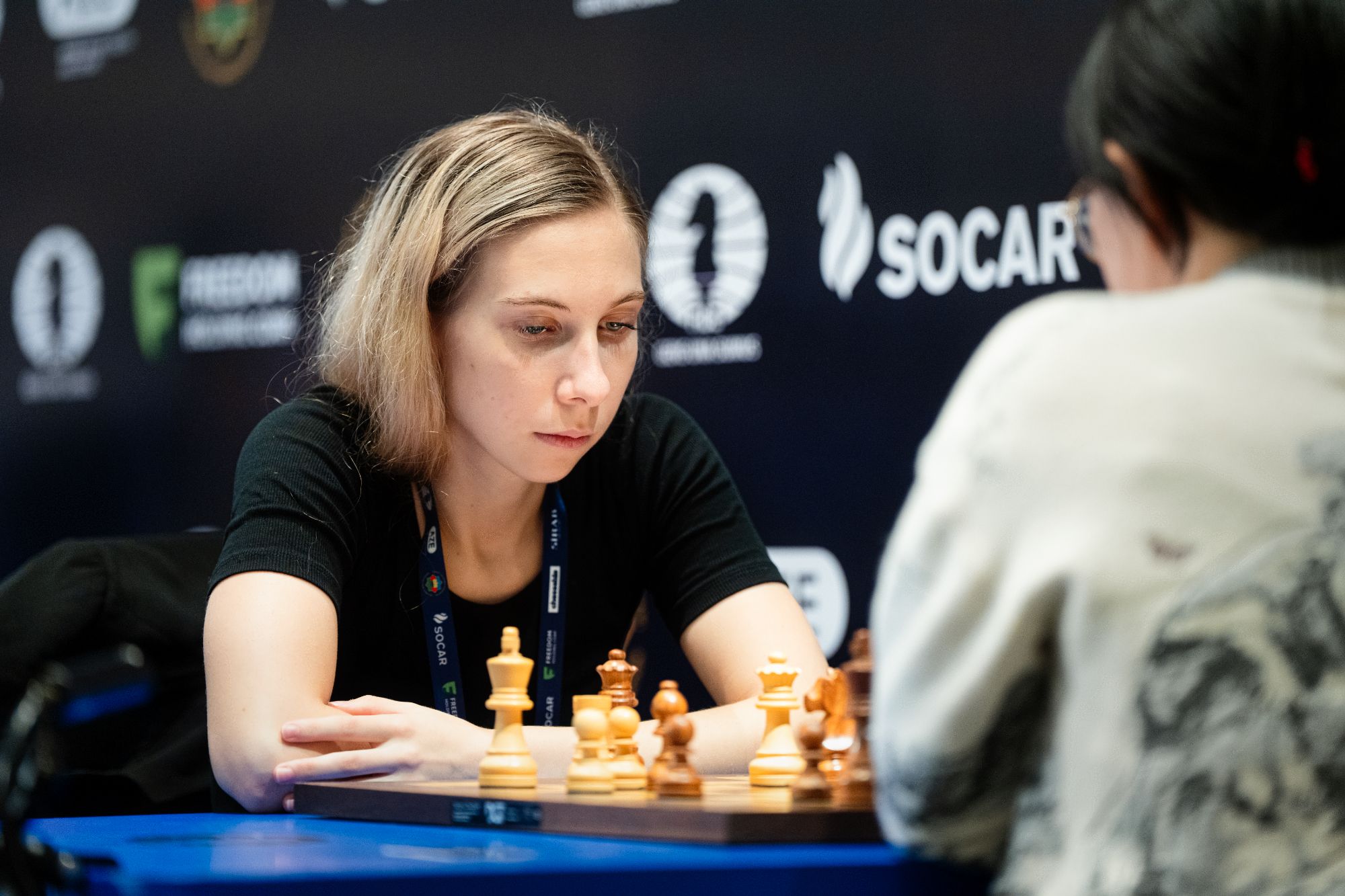
Similarly, she let an opening advantage slip in her first rapid tiebreak game, resulting in a must-win second game—which she did, as the only player to win on demand with Black. In the 10-minute games, Narva's small edge out of the opening didn't hang around for long, as the 2017 Women's world champion executed back-to-back brilliant moves to get a winning position and the full point.
The Chinese grandmaster eventually won their match by allowing no chances in their final game, but Narva is to be commended on her play in a match that was far closer than the 4-2 score would suggest.
All Games - Open and Women's Round 3 tiebreaks: 10-minute games

5-Minute Games: 1 Player Eliminated
Just one player was eliminated in the five-minute games, but what a departure it was. Giri's match was the only one of the three remaining matches to end in the two-game 5+3 matches, and it was a result that few would have predicted.
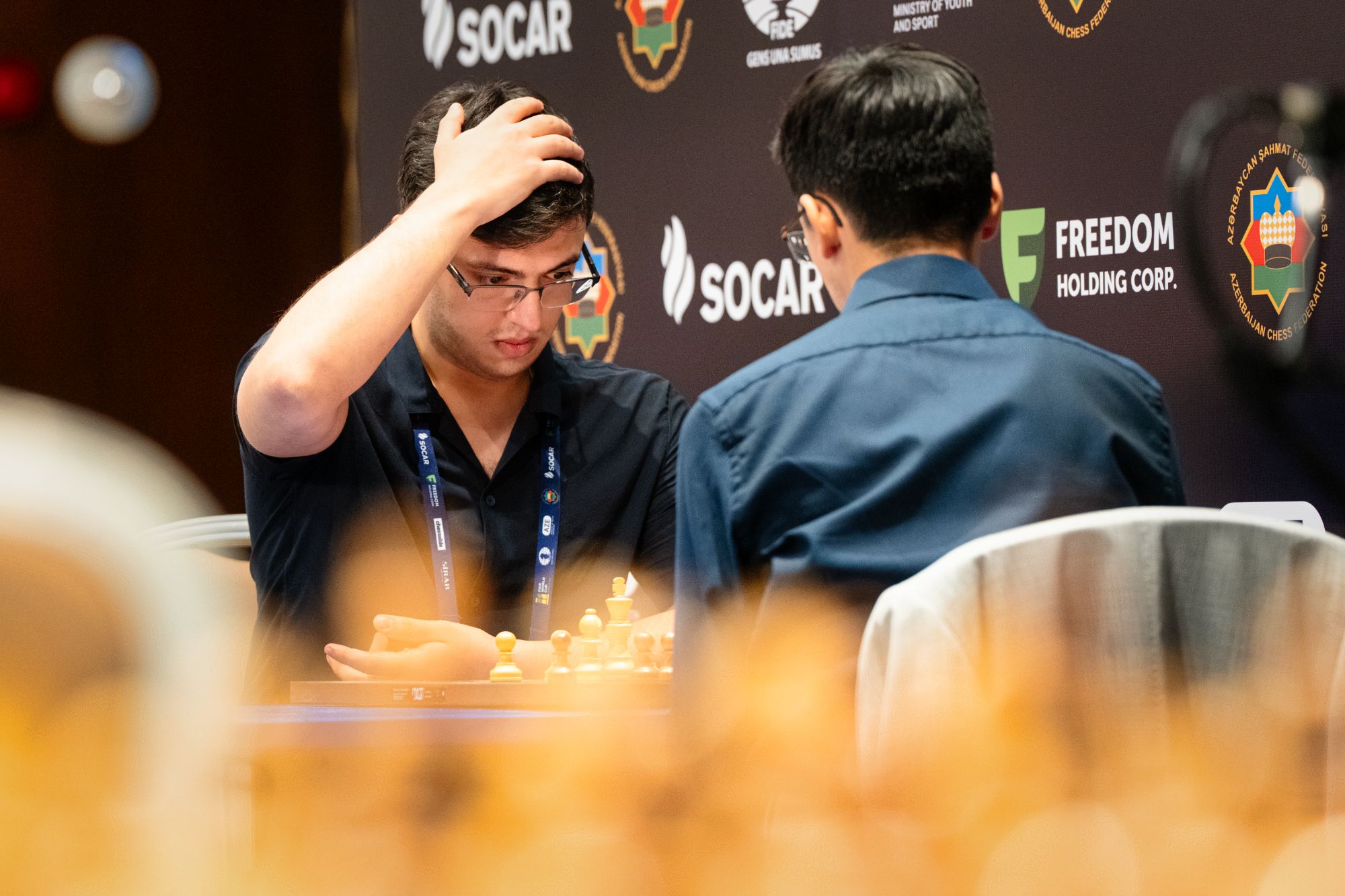
The Dutch super-GM played to a convincing win in the first 25-minute game, and was within a draw of progressing to the next round. Of course, if he had achieved the draw he needed, his match wouldn't be discussed in this part of the report.
Azerbaijani Abasov was on home turf and had fans to please, and was not going down without a fight. He managed to strike back to stay in the event, in our Game of the Day, which GM Rafael Leitao has annotated below.
Abasov's win allowed the match to continue, but as exciting games took place in other matches, one might be forgiven for forgetting that the Giri-Abasov match was still ongoing as the players played three successive quick and quiet draws: two in the 10-minute match, and one in the five-minute match as the 2017 Azerbaijani Champion seemed to squander his turn with the white pieces.
As it turned out, he was merely waiting for his opportunity, as he surprised Giri in the opening and got the complications he wanted in what was to be the last game of their match. The 2023 Tata Steel Masters winner flagged in a lost position and will be wondering how on earth his World Cup ended like this.
Anish Giri loses on time and it is Nijat Abasov who will face Peter Svidler in round four!#FIDEWorldCup pic.twitter.com/x3RfvrXe4Q
— chess24.com (@chess24com) August 7, 2023
All Games - Open and Women's Round 3 tiebreaks: 5-minute games

3-Minute games: 2 Players Eliminated
And then there were four. Four players, but just two places remaining in the fourth-round brackets. At this stage, sudden death was entered, where players alternated colors in 3+2 blitz games until a decisive result was reached—it was no longer necessary to win a best-of-two, meaning a single mistake could send a player packing with no chance to redeem themselves.
In the Open section, GMs Vidit Santosh Gujrathi and Matthias Bluebaum were the two players remaining. The tiebreaks were a result of Vidit having missed some chances in their classical match, but after a victory in the first 25-minute game, it was Bluebaum who had the upper hand.

The Indian super-GM won on demand in the second rapid game to take the match to 10-minute tiebreaks, where Vidit couldn't convert his advantage in the first game and two draws meant the players moved on to blitz.
With a loss in the first of the five-minute games, it looked as though Bluebaum's time was finally up, especially given the German grandmaster's terrible middlegame position in the must-win second game. Yet, in a miraculous recovery, the 2022 European champion turned the game around and lived to fight in yet another tiebreak.
With a draw being enough for Vidit to advance, Bluebaum recovers from a lost position and wins on demand to reach sudden death!#FIDEWorldCup pic.twitter.com/9sr1Ix9Nhe
— chess24.com (@chess24com) August 7, 2023
The sudden death game looked hopeless for Bluebaum, until he seized his opportunity to equalize the endgame. But it appeared he'd used up all his lives as he allowed Vidit to build a bridge just a few moves later, which allowed him to promote a pawn and win a long and no-doubt stressful match.
The two players remaining in the Women's section were Harika and IM Lela Javakhishvili. Their two 25-minute games ended in draws, and given how stressful the match ended up being, the former likely wishes she had spotted a big opportunity that she'd had in their second 25-minute game:
In the first 10-minute game, queens were traded early, but the Indian grandmaster showed that queens aren't necessary for an attack on your opponent's king, and she earned herself a convincing victory. Needing a draw, Harika looked like she blundered her queen to a discovered check, but it was a calculated decision that left her with a small edge, if not a queen.
When there's just one queen on the board, accurate play is needed from the queenless player, but in this case, Harika went astray and Javakhisvili was suddenly back in the match, although the Georgian IM did give her opponent one fleeting shot at a draw before bringing home the point and taking the match to the five-minute games.
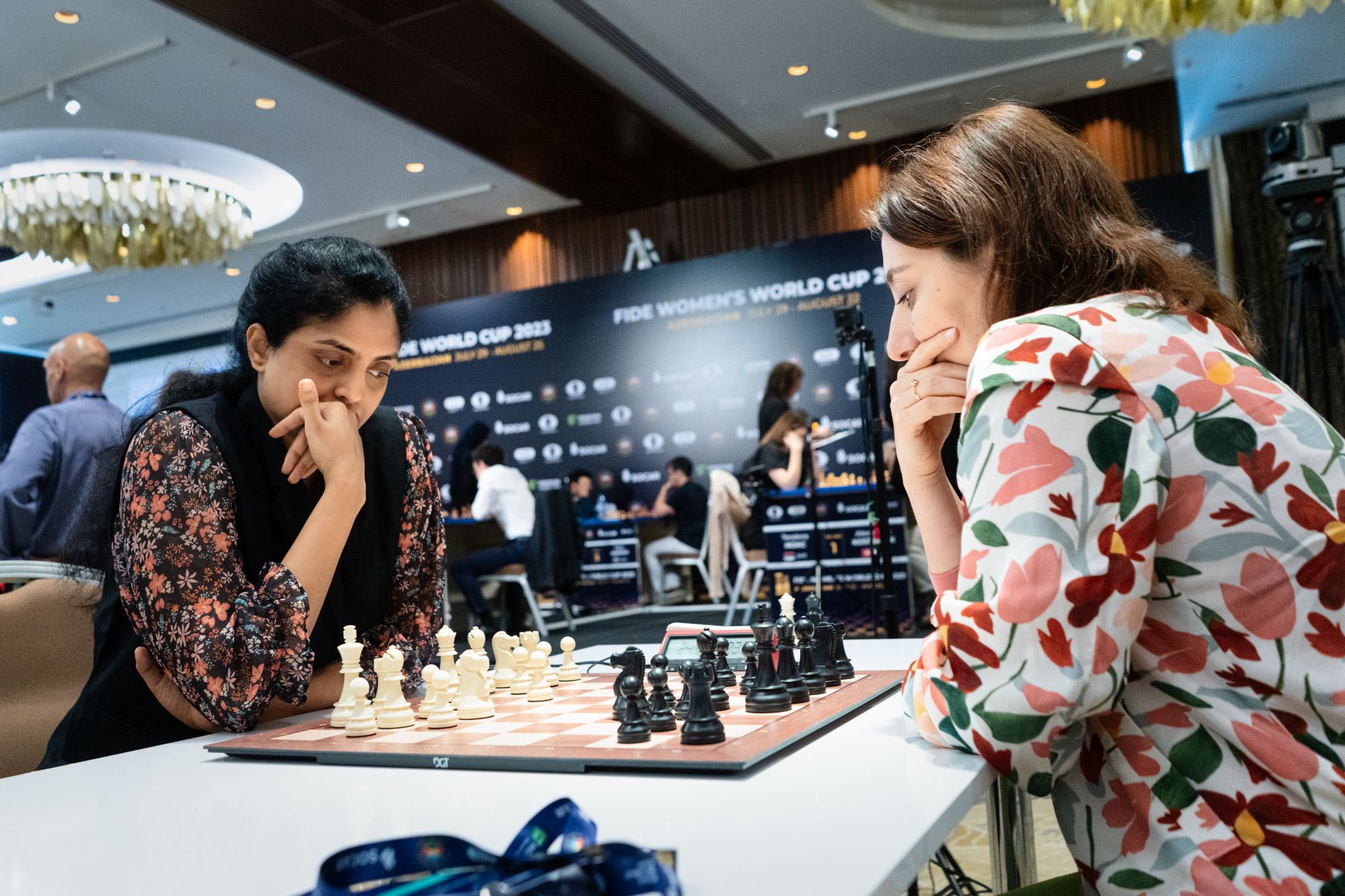
In the first of the five-minute games, Javakhisvili missed her chances and a draw resulted, while Harika was unable to cause problems in the second game and sudden death was reached. Yet another draw, the seventh of their match, was reached as the four-time Georgian women's champion opted not to push her small advantage with black and rather try her luck with the white pieces.
The second sudden death match saw an endgame being reached with barely any time left on either player's clock, and when Harika was given an opportunity she grabbed it and held onto it until the very end, where she couldn't contain her emotion as a tense and exhausting battle finally reached its conclusion.
GM @HarikaDronavali just physically collapses out of joy after winning the last game and making it to round four! #FIDEWorldCup pic.twitter.com/J5nz22crVE
— chess24.com (@chess24com) August 7, 2023
All Games - Open and Women's Round 3 tiebreaks: 3-minute games
48 players remain across both sections of the 2023 FIDE World Cup, and after the rest day we will see the following matches:
The Last 32 of the #FIDEWorldCup! pic.twitter.com/Du86LamY87
— chess24.com (@chess24com) August 7, 2023
The Last 16 of the Women's #FIDEWorldCup! pic.twitter.com/iaPut1Gwmw
— chess24.com (@chess24com) August 7, 2023
The 2023 FIDE World Cup and Women's World Cup in Baku, Azerbaijan, are big knockout events that will determine six spots in the 2024 FIDE Candidates Tournaments. The action begins July 30 and ends August 24, with a combined $2.5 million prize fund.
-
-
-
- Round 3.2: MVL Exits World Cup; Close Calls For Caruana, Ju
- Round 3.1: Svidler, Carlsen Cruise to Victory; Roebers on Perfect Score
- Round 2.3: Grischuk, Lagno Exit World Cup As Nakamura, So Survive
- Round 2.2: Mamedyarov, Abdusattorov, Shankland Crash Out Of World Cup
- Round 2.1: Carlsen, Caruana Start Fast, Praggnanandhaa Plays Masterpiece
- Round 1.3: Suleymanli Wins Epic Tiebreak As Carlsen, Nakamura Gear Up For Action
- Round 1.2: Favorites Strike Back As 33 Tiebreaks Await
- Round 1.1: Stunning Start By Ediz Gurel, World Cup's Youngest Player
- Carlsen Goes For First World Cup Win
- FIDE World Cup 2023: All The Information
-
-


